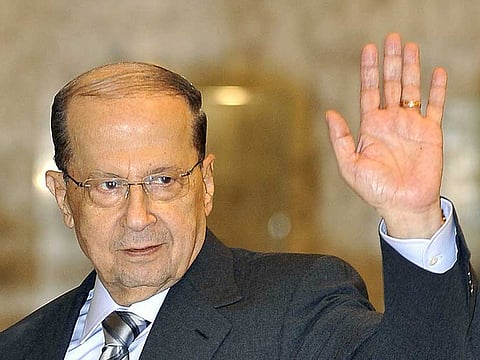Why the surprise that Lebanon cannot elect a president?
As various interest groups work at cross-purposes for their own selfish interests, chances are high that the position of president will remain vacant until next year

As this column foresaw in April 2014, no one has succeeded president Michel Sulaiman yet — and no one will probably fill the vacancy for a while.
Sulaiman ended his six-year term on May 24, 2014, while the Lebanese parliament, which elects the head-of-state, gathered on April 23, 2014, without, however, choosing a successor. After a 43rd consecutive convocation last Monday, the assembly once again failed to secure a quorum, which prompted Speaker Nabih Berri — who was habitually absent — to issue a new invitation for September 7, 2016.
The disputes are well-known and can be summarised in a single sentence: Michel Aoun, the March 8 candidate, insists that the presidency is his (and is backed in this quest by Hezbollah and others), while the Future bloc-led March 14 coalition prefers the avowedly pro-Syrian Sulaiman Franjieh. Both contenders are fielded to block the other, while swing voters, led by Druze chieftain Walid Junblatt and his Progressive Socialist Party deputies, have nominated Henri Helou in yet another obstructive step.
None of these candidates can win, but that’s the point because Lebanese elites do not wish to settle existing differences. Excuses abound as rivals denigrate each other, mock other candidates, hide behind a constitution that few respect, engage in political gymnastics worthy of Olympic medals — all the while pretending to govern what is now a failed state, even as most of the residents continue to enjoy life, pretending to inhabit a normal country.
Given the intransigence that the March 8 and 14 coalitions practice with unprecedented vengeance, can this “Gordian knot” be untied, and what conditions must be fulfilled to finally select a president?
Aoun — Hezbollah’s sole candidate for presidency who secured the backing of the Lebanese Forces on January 18, 2016 — is 82 years old. Given his checkered background — he was against the Syrians before he decided to be for them — only acolytes imagine that the stubborn former army commander can win, even if he believes that the office is his for the taking. Even close associates claim that Aoun suffers from a Napoleon-complex, while independent observers insist that only death will end his quest, which is an eternity in political life.
In the event Aoun is rejected by the March 14 coalition, there is a perfect antidote in deputy Franjieh — though even his candidacy is problematic. For now, the majority of the Future Bloc deputies have supported Franjieh, who leans towards March 8 and has declared being soulmates with Syrian President Bashar Al Assad. As a relatively young man, Franjieh, 50, can wait for a while, though it is unclear whether he will be able to secure 65 votes — half of the 128 deputies plus one.
In a tug-of-war worthy of the Game of Thrones, and in a land where political respect for the constitution is ephemeral at best, the end result is stalemate as neither of these two men are consensual or conciliatory candidates. Yet, unlike the Game of Thrones scenarios that regularly witness bloody confrontations, the Lebanese elites seem to have decided to save their financial empires, even if that effectively means that the highest position in the land will remain in abeyance. In other words, Lebanon will not repeat the civil war so that the elites who have accumulated vast financial resources can keep their wealth and continue to enjoy incredible monopolies.
Unending political clashes
Short of physical confrontations, therefore, elites are engaged in unending political clashes. A few rummage through the moribund ‘National Dialogue’, knowing full well that they cannot possibly agree on anything substantive. Others pretend to advance new electoral laws, aware that all 128 sitting parliamentarians are determined to renew their lucrative portfolios under the current rule, which, a fresh system will shake up. Still others contemplate the creation of a Senate as well as administrative decentralisation reforms, as stipulated in the 1989 Ta’if Accords, cognizant that the process is at least 25 years late with few takers before genuine reforms are introduced. A few have the courage to remind each other that the State, now personified by the Cabinet, cannot impose its authority on all of the national territory. In Lebanon, Hezbollah has acquired exclusive right to use arms, arrive at a decision over war and peace, go to war and intervene in other countries — all without conforming to state authority.
Political elites have accepted all of these realities, even if each one poses serious challenges to the Lebanese state and its citizens. Under the circumstances, why bother about a head-of-state, and why rush into prearranged compromises that will further undermine what’s left of Lebanon’s unity? Why even pretend that there is need for a president when the elites are engaged in business-as-usual?
Dr Joseph A. Kechichian is the author of the just published From Alliance to Union: Challenges Facing Gulf Cooperation Council States in the Twenty-First Century (Sussex: 2016).
Sign up for the Daily Briefing
Get the latest news and updates straight to your inbox



